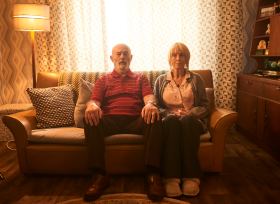Image: miff.com.au
In documentary filmmaking, maintaining balance on an inflammatory issue has become a rare art. Wielding the factual format as an act of advocacy, to push an agenda, or to stress an opinion is common, frequently resulting in stellar efforts, but often coming at the expense of thoughtfully exploring multiple sides of a tricky topic. It’s the atypical nature of the latter feat that elevates Welcome to Leith above many of its peers, while augmenting the impact of its uncomfortable subject matter. Exploring a community under siege from unwanted ideology, it dares to spend time with the town’s threats as well as its champions.
Leith is the type of rural American place the bulk of the world happily overlooks, an isolated patch of North Dakota long abandoned by the railroad and left to its own devices. That suits its residents, all 24 of them including children, perfectly – until a newcomer starts purchasing plots of land. Their small-town welcome falters when the identity and aims of their new neighbour becomes clear. A known white nationalist, white separatist and neo-Nazi, Craig Cobb isn’t seeking a quiet place in the country, but a location to base his movement.
If told in the manner most would expect – tracking the obvious disruption Cobb causes, the attention he brings to the otherwise sleepy town, and the clash of wills and ways of life that ensues, be it on the streets, in the media or in the courts – the details of Welcome to Leith would have made for rousing viewing. In fact, much of the film unravels in this manner, and does indeed stir the expected shock, disbelief and horror that can easily be anticipated from such a toxic scenario. And yet, imparting the accounts of the ordinary folks vehemently opposed to this intrusion into their home is only telling part of the story. Neither sympathising with them nor overtly judging them, directors Michael Beach Nichols (Flex Is Kings) and Christopher K. Walker also chat with Cobb and his supporters, because doing so provides a more complete picture of the complex circumstances.
Indeed, even with the ample talking heads of townsfolk and experts retaining focus, their film is crafted in the same manner as a fictional psychological thriller: setting the scene, dissecting the events in question and tracking the reaction, all while intercutting glimpses of the gun-toting, abuse-hurling perpetrator’s mindset. Accordingly, Welcome to Leith‘s biggest punch comes not just from the harrowing ordeals depicted, the debate about freedom and the meaning of democracy it inspires, or the inevitable “what would I do?” question the audience asks themselves, but from their combination with Cobb and company’s own words. More damage is done to their cause directly from their own mouths than the documentary could hope to show otherwise.
That’s the blow candid reality rendered objectively lands, and one that’s all the more powerful in a two-sided affair. The feature’s unsettling, urgent air emanates equally from those frightened and those evoking fear, with the latter a fleshed-out presence rather than a barely-sighted, already-accepted boogeyman. Transporting the viewer to the thick of the agitation and insidiousness is the gripping end result, as shot by Nichols with an understanding of the rural beauty of the town at the centre, and edited together by the directors and Joshua Woltermann (The Man Behind the Curtain) with an awareness of the inherent tension of the situation sans histrionics or embellishment. That Welcome to Leith slaps viewers in the face with its terror is far from surprising; what astonishes is how immediate, earned and even-handed that sensation feels.
Rating: 4 stars out of 5
Welcome to Leith
Director: Michael Beach Nichols and Christopher K. Walker
USA, 2015, 85 mins
Melbourne International Film Festival
July 30 – August 16
Actors:
Director:
Format:
Country:
Release:




